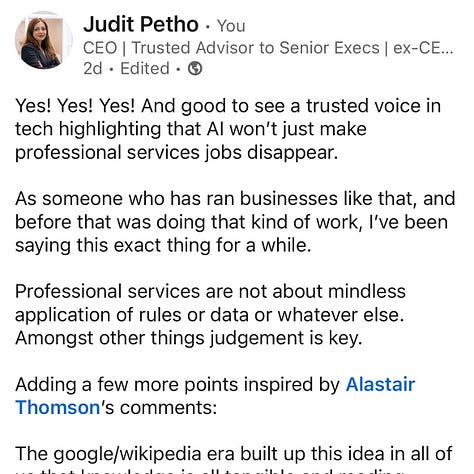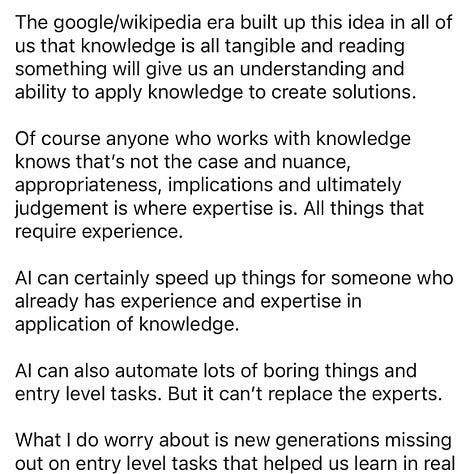AI Everything; Mistakes Were Made – Firefighting, learning, and dealing with Customer service issues
The conversation about AI as a way of business is starting to look a bit more grown-up and nuanced now that we have a tiny bit more experience with applications.
Here’s a good take from Ben Evans — and me vibing off it.



(You can see I vibe my way through posting on LinkedIn and don’t have AI write posts for me from the tone and the typos… Also, the whole discussion about em dashes being the sign of AI is silly.)
=> The FT ran an interesting article about the Big 4 planning assurance services for AI – a bit like they do for finance and accounts. Which is a good thing, in my opinion.
Wouldn’t you feel more comfortable with your bank or your doctor, or a biotech firm developing a life-saving treatment or sequencing genomes, if the AI solutions they rely on were checked by an independent organisation? I would.
But I don’t think developing the audit methodology for AI will be that easy or fast. There is also no regulatory framework for them to adhere to. It is important that these services do not become money-making gimmicks but truly help establish more safety, accountability, and credibility.
=> I was reading up on the collapse of Builder.ai, backed by Microsoft and Qatari investors, driven by artificially inflated revenue from contracts. Let’s forget about the proper accounting treatment of discounts on sales, there were two things that stood out for me. One is that Builder.ai says it has been audited by a Big 4. I have no facts other than the article from a reputable publication, so I don’t know if this is the case.
Two, we see too many startups chasing unicorn status or huge investments by inflating revenue/sales figures (this is NOT about having overly ambitious sales forecasts, but actually putting down fictional revenue figures).
It has been a running joke that so many of the previous Forbes 30 under 30 founders ended up convicted for fraud after chasing these crazy numbers and status instead of steadily building the business. It almost doesn’t matter whether this is driven by the founders or the funders. What does matter is that I think there is a sore need for more accounting and governance skills on startup boards that often include mostly VCs. Food for thought for those who want to build lasting businesses.
=> Surely I’m not the only one who struggles occasionally with concentrating, with keeping your focus on what you’re reading, writing or listening to. I have actually found something that works for me and helps me keep my thoughts where they need to be. Loyal readers of this newsletter might remember that I am a big fan of the Apple TV+ show, Severance. It is a unique and brilliant show, especially season 2. Apple TV also put on YouTube a “playlist”, it’s not really a proper name for this, with the title: Severance – Theme Song: 8 Hour Work Day Innie Mix.
I do not know what is going on here, but there is something about this theme song (repeating for 8 hours, yes) that just makes my brain snap out of frazzled thoughts and trying to keep up with the latest geopolitical explosion and makes me concentrate and be focused on one thing. Do check it out and let me know if it works for you. I’d also be interested in the neuroscience behind this if anyone has any experience.
With that, let’s move on to the main topic of today – keeping customers happy.
It is a well-established maxim in all kinds of service-based industries that keeping existing customers happy is cheaper than acquiring new ones. Even more so when you have big-ticket contracts, and switching suppliers is easy.
But it is one of the basic tenets of running services businesses, whether B2B or B2C: If you have clients/customers/users you have to be ready to solve unforeseen problems impacting the service they are receiving from you – and you have to do it swiftly.
This is critical for profit and longevity: customers must be happy with your services so they come back for more and recommend you to others. They cannot be made to feel unimportant. Yet, so many businesses get it wrong or just don’t think about it much. And yes, this issue is existential and belongs on the desk of a CEO – not just to a client service team.
How many times over the past five years have you received bad service? You, personally. In a restaurant. At a hairdresser's. From the accountants. The lawyers. The estate agent. Your employer’s supplier.
There will always be problems, there will always be mistakes. Sometimes they are no one’s fault, sometimes they result from a lack of care or a flaw in the system. And often they are made by your company, your employees. It’s almost unavoidable. But how you handle it matters.
Every customer accepts that mistakes happen. But if they are met with denial, pushback and a self-righteous attitude from the service provider, that will only antagonise customers (rightly so). To get a handle on the situation, sometimes you, as a leader, have to get involved personally. Sort out immediately what you can, put your best people on fixing whatever is complex and keep an eye on the proceedings if it is an impactful mistake or a repeat customer. (I’m using client, customer and user interchangeably.)
Being quick, communicative and helpful to the client is critical in this situation. If they are a repeat or potentially long-term customer, even more so. Even a simple message, “I’m sorry this is happening, I’m on it, this is important for us”, will have a big impact.
This is just as important for B2B services – those users/customers/clients are people at the end of the day, not faceless companies. They need to be handled not just as representatives of their companies but as people with their own goals and reputations. Make a client look bad in front of their boss, and they’ll never work with you or your company again. Give them enough information and reassurance that they can reassure their own bosses and protect their own position, then fix the problem, and they’ll stick with you. Otherwise, you’ll have an antagonist as a customer.
As you work on a solution,



